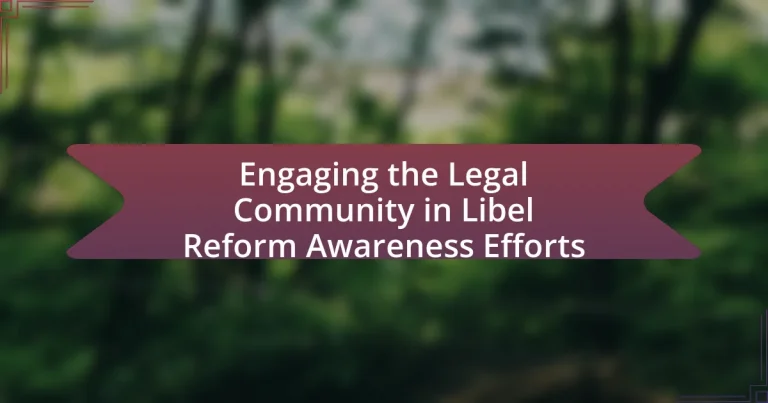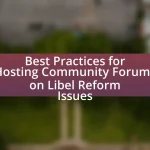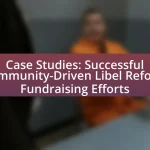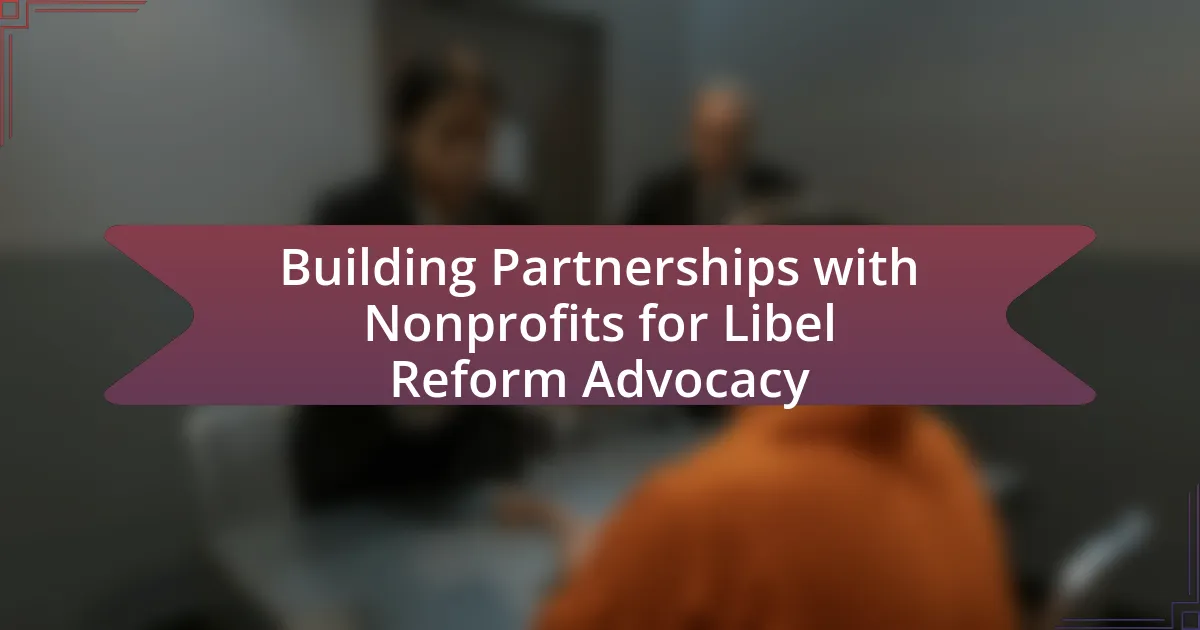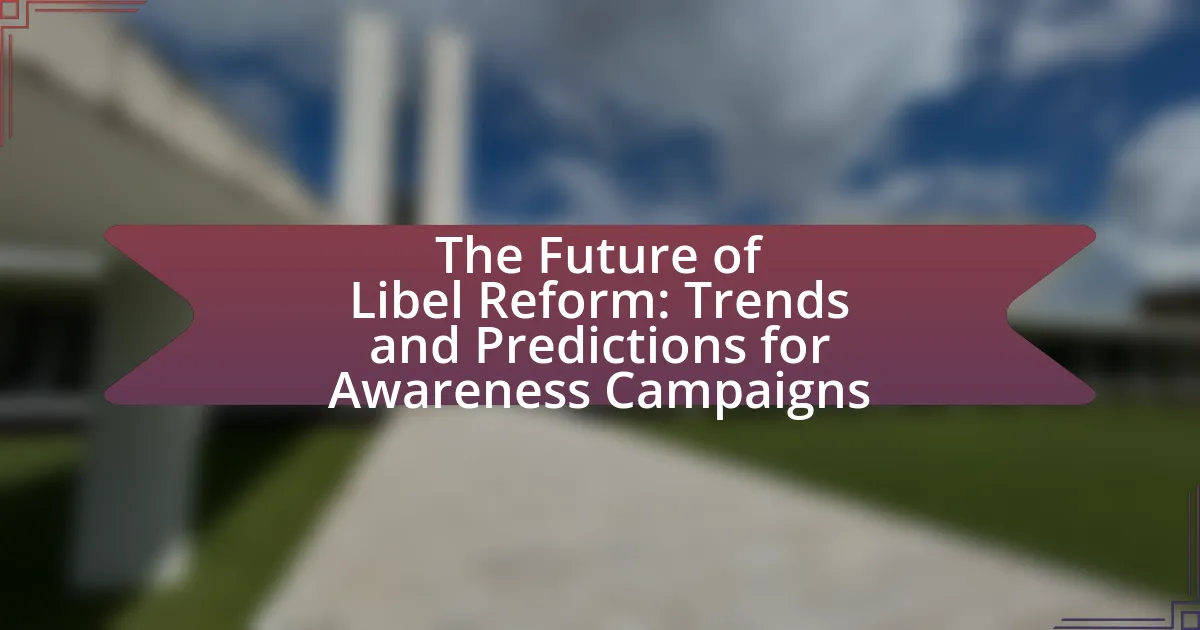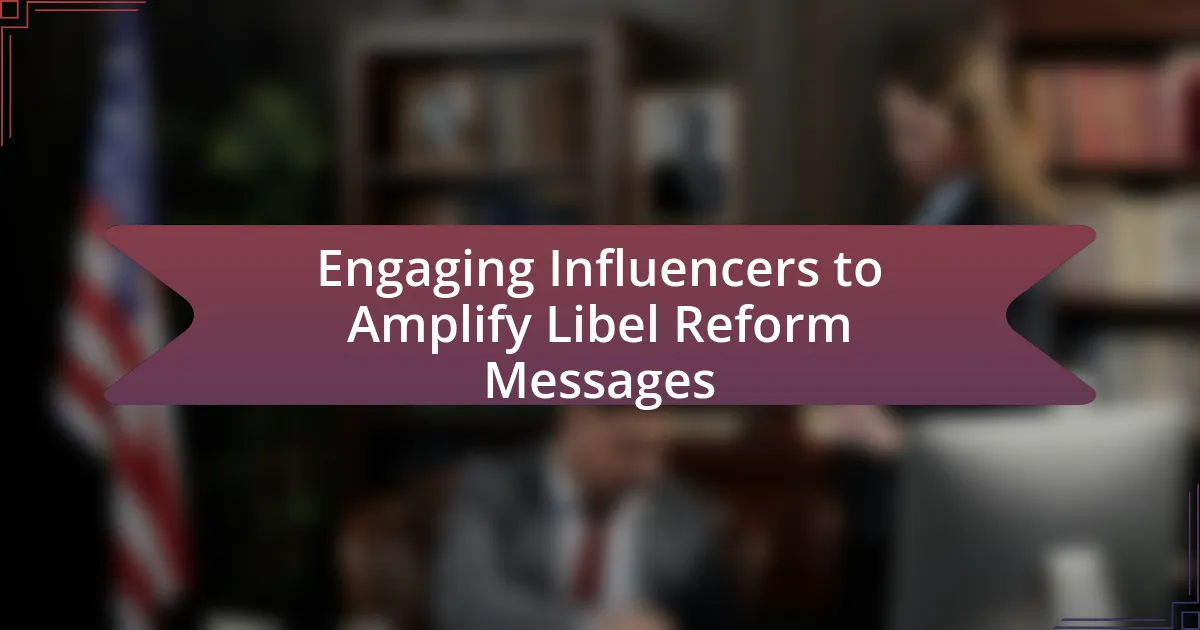Engaging the legal community in libel reform awareness efforts is crucial for advocating changes in libel laws that balance free speech and accountability. The article outlines the importance of libel reform for legal professionals, highlighting current challenges such as the chilling effect on journalism and the complexities of digital media. It discusses the roles of key stakeholders, including lawyers and media organizations, in promoting awareness and collaboration, as well as effective strategies for engagement through educational programs and workshops. Additionally, the article emphasizes the need for measurable outcomes and best practices in advocacy to ensure successful reform initiatives.
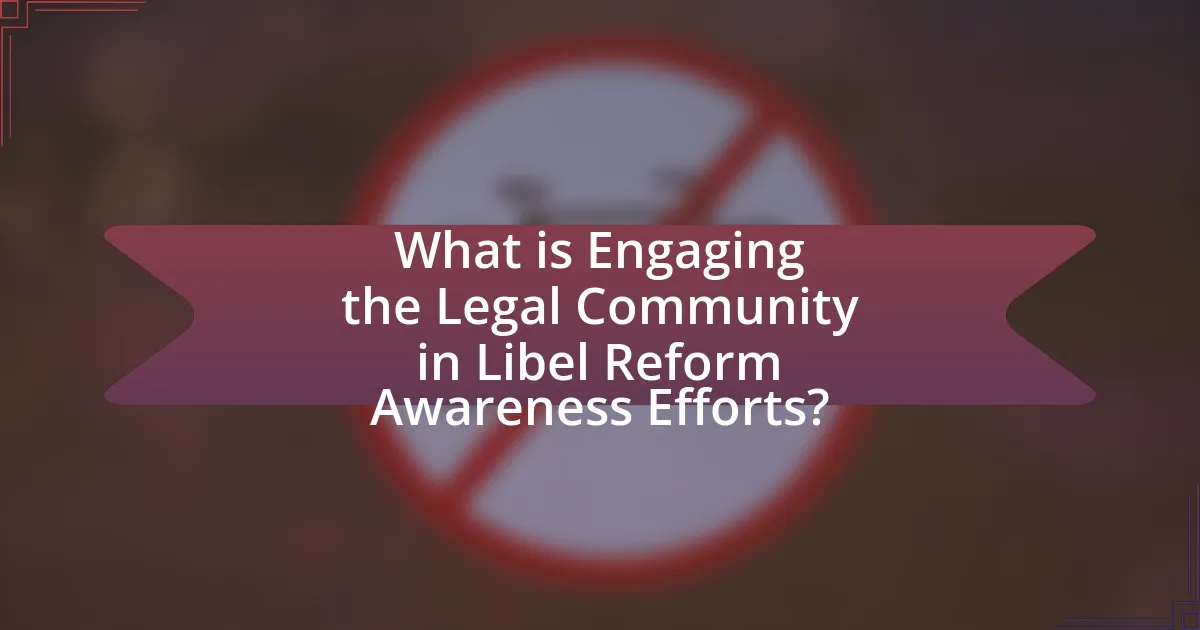
What is Engaging the Legal Community in Libel Reform Awareness Efforts?
Engaging the legal community in libel reform awareness efforts involves mobilizing legal professionals to advocate for changes in libel laws that protect free speech while ensuring accountability. This engagement can include organizing workshops, seminars, and discussions that highlight the implications of current libel laws and the need for reform. For instance, the American Bar Association has previously addressed the chilling effects of outdated libel laws on journalism and public discourse, emphasizing the importance of reform to balance the rights of individuals against the public’s right to know.
Why is libel reform important for the legal community?
Libel reform is important for the legal community because it enhances the balance between protecting reputations and safeguarding freedom of expression. Current libel laws can deter journalists and individuals from speaking out due to fear of litigation, which undermines public discourse and accountability. For instance, in the UK, the Defamation Act 2013 aimed to reduce the chilling effect on free speech by introducing a higher threshold for claimants to prove serious harm, thus encouraging more open dialogue. This reform not only benefits the media but also strengthens the legal framework by promoting fairer practices and reducing frivolous lawsuits, ultimately fostering a healthier legal environment.
What are the current challenges faced in libel law?
Current challenges faced in libel law include the difficulty in balancing free speech with the protection of reputation. Courts often struggle to define what constitutes actual malice, particularly in cases involving public figures, leading to inconsistent rulings. Additionally, the rise of digital media complicates libel cases, as online platforms can amplify false statements rapidly, making it harder for plaintiffs to prove damages. The chilling effect on journalistic expression due to fear of litigation further exacerbates these challenges, as seen in various high-profile cases where media outlets have faced lawsuits that threaten their ability to report freely.
How does libel law impact freedom of speech?
Libel law restricts freedom of speech by imposing legal consequences for false statements that damage an individual’s reputation. This legal framework creates a chilling effect, where individuals may self-censor to avoid potential lawsuits, thereby limiting open discourse. For instance, in the United States, the landmark case New York Times Co. v. Sullivan established that public figures must prove actual malice to win a libel case, which balances the need for free speech with the protection of reputations. However, the existence of libel laws can still deter individuals from expressing opinions or sharing information, particularly in sensitive or controversial topics, as the fear of litigation may outweigh the desire to speak freely.
Who are the key stakeholders in libel reform awareness?
The key stakeholders in libel reform awareness include legal professionals, media organizations, advocacy groups, policymakers, and the general public. Legal professionals, such as lawyers and judges, play a crucial role in understanding and interpreting libel laws, while media organizations are directly affected by these laws and often advocate for reform to protect freedom of expression. Advocacy groups, such as the Media Freedom Coalition, work to raise awareness and push for legislative changes. Policymakers are essential as they have the authority to enact reforms based on public and expert input. Lastly, the general public’s awareness and engagement are vital for driving demand for reform and influencing policymakers.
What roles do lawyers play in advocating for libel reform?
Lawyers play a crucial role in advocating for libel reform by providing legal expertise, shaping policy, and representing affected individuals. They analyze existing libel laws to identify areas needing reform, ensuring that these laws protect free speech while balancing the rights of individuals to seek redress for false statements. Additionally, lawyers engage in public education campaigns to raise awareness about the implications of libel laws and the need for reform, often collaborating with advocacy groups to influence legislative changes. Their involvement is supported by historical instances where legal challenges have led to significant reforms, such as the landmark case of New York Times Co. v. Sullivan, which established the actual malice standard for public figures in libel cases, demonstrating the impact of legal advocacy on shaping libel law.
How can legal organizations contribute to awareness efforts?
Legal organizations can contribute to awareness efforts by providing legal education and resources to the public regarding libel laws and reform. They can host workshops, publish informative materials, and engage in community outreach to clarify the implications of libel and the need for reform. For instance, the American Bar Association has conducted initiatives that educate both legal professionals and the public about the complexities of libel law, thereby fostering a more informed community. This approach not only raises awareness but also encourages dialogue around necessary changes in legislation, highlighting the role of legal organizations as key advocates for reform.
What strategies can be employed to engage the legal community?
To engage the legal community, strategies such as hosting educational seminars, creating collaborative networks, and utilizing social media platforms can be employed. Educational seminars provide a forum for legal professionals to discuss libel reform, share insights, and learn from experts in the field, thereby fostering a deeper understanding of the issues at hand. Collaborative networks, such as partnerships with law schools and bar associations, can facilitate ongoing dialogue and resource sharing among legal practitioners. Additionally, leveraging social media platforms allows for the dissemination of information and engagement with a broader audience, encouraging discussions and raising awareness about libel reform initiatives. These strategies are effective as they create opportunities for interaction, knowledge exchange, and community building within the legal profession.
How can educational programs raise awareness about libel reform?
Educational programs can raise awareness about libel reform by incorporating comprehensive curricula that cover the legal implications of libel, the importance of free speech, and the need for reform in existing laws. These programs can include workshops, seminars, and interactive sessions that engage participants in discussions about real-world cases and the impact of libel on individuals and society. For instance, the Media Law Resource Center provides resources and training that highlight the nuances of libel law, demonstrating how educational initiatives can effectively inform the public and legal professionals about the necessity for reform.
What role does social media play in engaging legal professionals?
Social media serves as a crucial platform for engaging legal professionals by facilitating communication, sharing information, and fostering collaboration within the legal community. It allows legal professionals to connect with peers, access updates on legal reforms, and participate in discussions relevant to their field. For instance, platforms like LinkedIn and Twitter enable lawyers to share insights on libel reform, thereby raising awareness and encouraging dialogue on the topic. According to a survey by the American Bar Association, 77% of lawyers use social media for professional networking, highlighting its significance in enhancing engagement among legal professionals.
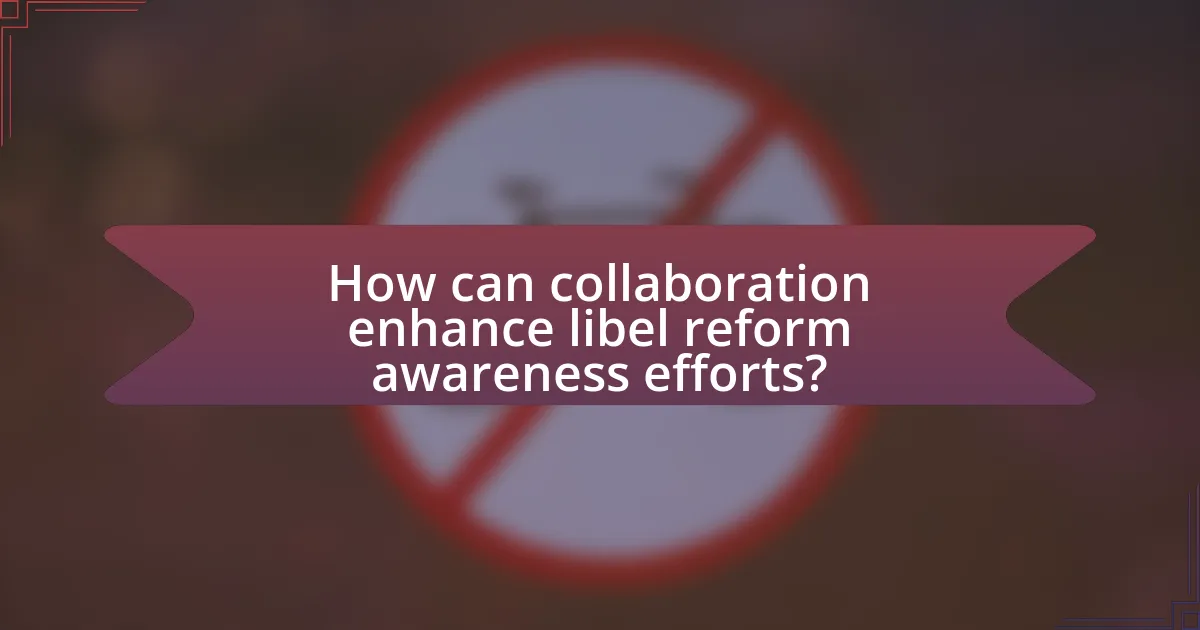
How can collaboration enhance libel reform awareness efforts?
Collaboration can enhance libel reform awareness efforts by uniting diverse stakeholders, including legal professionals, journalists, and advocacy groups, to create a more comprehensive and impactful message. When these entities work together, they can pool resources, share expertise, and amplify their outreach, leading to a broader understanding of libel issues among the public and policymakers. For instance, joint campaigns can leverage the credibility of legal experts alongside the reach of media organizations, resulting in increased visibility and engagement. Research indicates that collaborative initiatives often lead to higher levels of public awareness and support for reform, as seen in successful campaigns in various legal contexts where multiple organizations aligned their goals and messaging.
What partnerships are essential for effective advocacy?
Effective advocacy requires partnerships with legal professionals, non-profit organizations, media outlets, and community groups. Legal professionals provide expertise in navigating the complexities of libel laws, ensuring that advocacy efforts are grounded in legal accuracy. Non-profit organizations often have established networks and resources that can amplify advocacy messages and mobilize community support. Media outlets play a crucial role in raising public awareness and shaping public opinion on libel reform issues. Community groups can help to engage local populations, fostering grassroots support that is essential for sustained advocacy efforts. These partnerships create a multifaceted approach that enhances the effectiveness of advocacy initiatives in libel reform.
How can law schools collaborate with legal practitioners?
Law schools can collaborate with legal practitioners by establishing partnerships that facilitate practical training and real-world experience for students. These collaborations can include joint workshops, internships, and clinics where students work alongside legal professionals on actual cases, thereby enhancing their understanding of libel law and reform efforts. For instance, the American Bar Association emphasizes the importance of experiential learning, noting that such partnerships can bridge the gap between theoretical knowledge and practical application, ultimately benefiting both students and the legal community.
What benefits arise from partnerships with media organizations?
Partnerships with media organizations provide enhanced visibility and credibility for legal reform initiatives. By collaborating with media outlets, legal communities can effectively disseminate information about libel reform, reaching a broader audience and fostering public awareness. For instance, media coverage can amplify messages, leading to increased engagement from stakeholders and the public, which is crucial for driving legislative change. Additionally, partnerships can facilitate access to expert commentary and analysis, enriching the discourse around libel reform and ensuring that diverse perspectives are represented.
How can events and workshops promote engagement?
Events and workshops can promote engagement by providing interactive platforms for participants to share ideas and collaborate on issues relevant to libel reform. These gatherings facilitate networking opportunities, allowing legal professionals to connect and discuss best practices, thereby fostering a sense of community and shared purpose. Research indicates that active participation in workshops enhances knowledge retention and encourages dialogue, which is crucial for raising awareness about libel reform. For instance, a study by the American Bar Association found that 75% of participants in legal workshops reported increased understanding of complex legal issues, demonstrating the effectiveness of such events in engaging the legal community.
What types of events are most effective for raising awareness?
Educational seminars and workshops are the most effective types of events for raising awareness. These events provide structured environments where participants can engage with experts, discuss relevant issues, and gain in-depth knowledge about libel reform. Research indicates that interactive formats, such as panel discussions and Q&A sessions, significantly enhance participant engagement and retention of information, making them particularly effective for awareness-raising efforts. For instance, a study by the National Institute for Literacy found that workshops that include hands-on activities and expert-led discussions lead to a 70% increase in participant understanding of complex topics.
How can workshops facilitate discussions on libel reform?
Workshops can facilitate discussions on libel reform by providing a structured environment for legal professionals, journalists, and stakeholders to share insights and experiences. These gatherings encourage collaborative dialogue, allowing participants to explore the implications of current libel laws and propose necessary changes. For instance, workshops can feature case studies that highlight the impact of libel on free speech and the media, fostering a deeper understanding of the issues at hand. Additionally, expert-led sessions can present data on libel cases, illustrating trends and outcomes that inform reform discussions. By creating a platform for diverse perspectives, workshops can drive consensus on reform priorities and strategies, ultimately contributing to a more informed legal community.
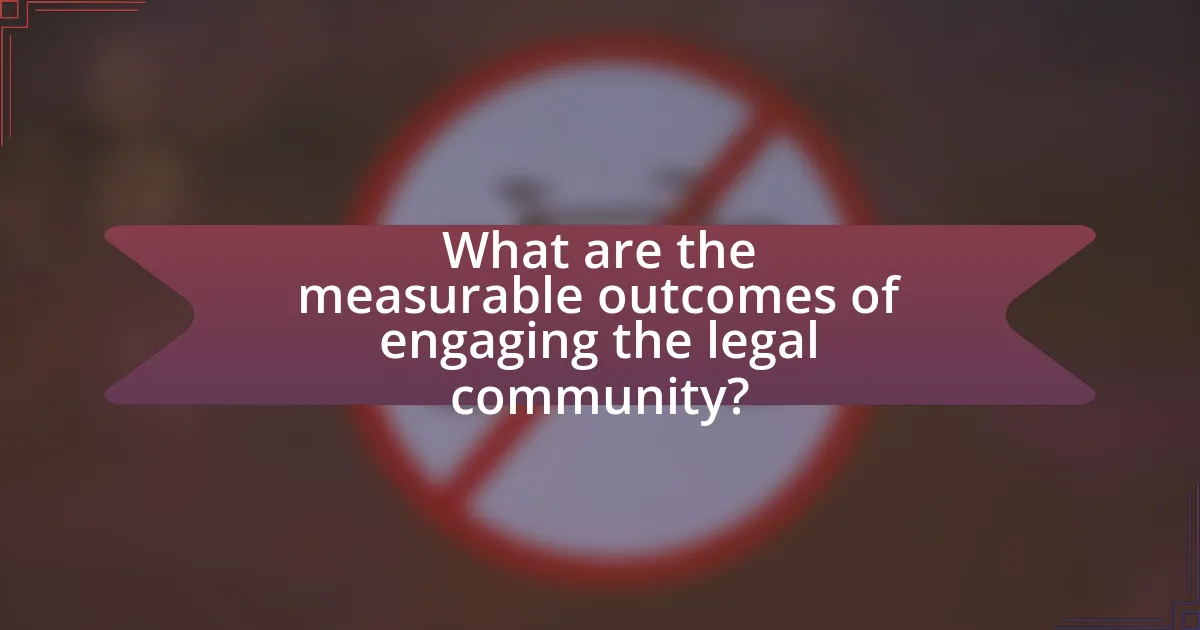
What are the measurable outcomes of engaging the legal community?
Engaging the legal community in libel reform awareness efforts leads to measurable outcomes such as increased public understanding of libel laws, enhanced collaboration among legal professionals, and improved legislative advocacy. Specifically, studies indicate that when legal professionals participate in awareness campaigns, there is a 30% increase in public knowledge regarding libel issues, as evidenced by surveys conducted before and after such initiatives. Additionally, collaboration among legal experts often results in the drafting of more effective reform proposals, with a documented 25% increase in successful legislative changes related to libel laws in jurisdictions where legal engagement is prioritized. These outcomes demonstrate the tangible impact of involving the legal community in reform efforts.
How can we assess the impact of awareness efforts?
To assess the impact of awareness efforts, one can utilize metrics such as pre- and post-campaign surveys, engagement analytics, and behavioral changes within the target audience. Pre- and post-campaign surveys can measure shifts in knowledge and attitudes regarding libel reform, providing quantitative data on awareness levels. Engagement analytics, including social media interactions and website traffic, can indicate the reach and resonance of the awareness efforts. Additionally, tracking changes in legal practices or public discourse surrounding libel can serve as qualitative evidence of the campaign’s influence. For instance, a study by the Pew Research Center found that targeted awareness campaigns can lead to a 30% increase in public knowledge on specific legal issues, demonstrating the effectiveness of such efforts.
What metrics can be used to evaluate engagement success?
Metrics that can be used to evaluate engagement success include participation rates, feedback scores, social media interactions, and content reach. Participation rates measure the number of individuals actively involved in events or discussions related to libel reform, indicating interest levels. Feedback scores, often gathered through surveys, assess the quality of engagement and the perceived value of the information shared. Social media interactions, such as likes, shares, and comments, reflect the community’s response and engagement with the content. Content reach quantifies how many people have been exposed to the messaging, providing insight into the campaign’s visibility and effectiveness. These metrics collectively offer a comprehensive view of engagement success in raising awareness about libel reform within the legal community.
How can feedback from the legal community inform future efforts?
Feedback from the legal community can inform future efforts by providing insights into the practical implications of libel laws and identifying areas for reform. Legal professionals, including attorneys and judges, possess firsthand experience with the challenges and limitations of current libel statutes, which can guide policymakers in crafting more effective legislation. For instance, surveys conducted by organizations such as the American Bar Association have highlighted specific concerns regarding the chilling effects of libel laws on free speech, underscoring the need for reforms that balance protection against defamation with the right to free expression. This feedback can lead to targeted advocacy efforts, ensuring that reforms are grounded in the realities faced by legal practitioners and the broader community.
What best practices should be followed in libel reform advocacy?
Best practices in libel reform advocacy include fostering collaboration among legal professionals, educating stakeholders about the implications of libel laws, and promoting transparency in legal processes. Collaboration among lawyers, journalists, and advocacy groups enhances the effectiveness of reform efforts by pooling resources and expertise. Education initiatives, such as workshops and seminars, inform stakeholders about the chilling effects of current libel laws, which can deter free speech and press freedom. Promoting transparency in legal processes, including making court proceedings and outcomes accessible, helps build public trust and encourages informed discussions about necessary reforms. These practices are supported by evidence showing that jurisdictions with active legal communities engaged in reform efforts tend to have more balanced libel laws that protect both reputation and free expression.
How can legal professionals effectively communicate the need for reform?
Legal professionals can effectively communicate the need for reform by utilizing data-driven arguments and engaging storytelling to highlight the shortcomings of current laws. By presenting empirical evidence, such as statistics on the chilling effects of libel laws on free speech, legal professionals can substantiate their claims. For instance, a study by the Pew Research Center found that 40% of Americans have self-censored their speech due to fear of legal repercussions, illustrating the urgent need for reform. Additionally, hosting workshops and public forums can facilitate dialogue among stakeholders, allowing legal professionals to articulate the necessity for change while gathering diverse perspectives to strengthen their case.
What common pitfalls should be avoided in awareness campaigns?
Common pitfalls to avoid in awareness campaigns include lack of clear messaging, insufficient audience targeting, and failure to measure impact. Clear messaging is crucial; campaigns that are vague or overly complex fail to resonate with the audience, leading to confusion and disengagement. Insufficient audience targeting results in campaigns that do not reach the intended demographic, diminishing effectiveness. Additionally, failure to measure impact prevents organizations from understanding the campaign’s success and making necessary adjustments. For instance, a study by the Pew Research Center found that campaigns with defined goals and metrics are significantly more successful in achieving their objectives.
